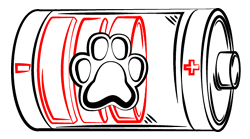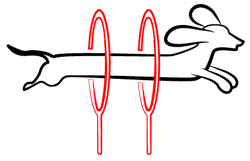
Paws ‘N’ Pups Quickview
Size
| Energy Level
| Trainability
| Paws ‘N’ Pups Rank
|
Characteristics
| Physical Characteristics: Height: 10-15” Weight: 10-25 lbs. Energy Level: Moderate – High | Colors: The Puggie is found in the following colors:
|
Health & Longevity
Average Life Span: 8-11 years
Quirky and adorable, the Puggie is a unique, very rare crossbreed between a Miniature Collie (Shetland Sheepdogs) and a Pug. These pups, while generally healthy, are prone to a few health issues, thanks to their parent breeds. Little is known about the Puggie because these pups are so rare and relatively new to the crossbreed scene, so information about their health is speculation drawn from the history of their parent breeds.
Hip Dysplasia
This birth defect occurs when the joint is malformed, causing it to slide out of the socket. It varies in severity, but symptoms include an awkward gait and an obvious limp. Over time, if left untreated, this condition causes cartilage deterioration and painful arthritis. Surgery is recommended to correct this health issue.
Reverse Sneezing
This condition is common in all dogs, but it is most prevalent in pups with brachycephalic parent breeds. Air becomes trapped in the nasal passages, causing a huffing sneeze that can be rapid and repetitive. While scary, this condition isn’t dangerous. If you are concerned, feel free to ask your vet to perform an examination to rule out more serious conditions.
Other health problems that could affect your Puggie’s quality of life include respiratory issues, Cushing’s disease, and hypothyroidism. Puggies have an average lifespan between 8-11 years, but a Puggie in perfect health could live upwards of 15 years.
Temperament & Train-ability
The Puggie is an interesting combination of genetics, as both parent breeds have mismatched personalities that vary from dog to dog. Generally, the Puggie is a kind, cautious pup with a rambunctious, high-energy method of play. She is considered to be on the small side of mid-sized, so she may have a few issues with her height and dominance. If you go to a dog park, she will either shy away from larger dogs, or challenge them for position as alpha. You have to train them from a young age to be accepting of both children and other dogs.
They could be good family pets, but you need to teach your children how to treat your Puggie with respect and kindness. These pups react negatively to negative attention, so tail-pulling or bowl-stealing might result in a growl or warning nip.
Thanks to the Pug genetics, the Puggie is an intuitive, empathic pup who can pick up and reflect your moods. If you are feeling grumpy and withdrawn, expect your Puggie to act the same. If you are happy, boisterous, and giddy, your Puggie will mirror those elements in everything you do that day. She will also follow you around constantly, playing for your affections and attentions at all times.
When it comes to exercise, your Puggie needs plenty of activity, both mental and physical, to keep her in tip-top condition. She is prone to obesity and related problems, so make sure you take her for a walk at least twice a day to expend her energy and burn away excess calories. Because of her Pug parent, she naturally loves to nap and be lazy, so sometimes you have to get her up and moving to keep her active. Your Puggie would benefit from a fenced-in backyard where she can frolic and explore at her leisure.
Puggies might be a challenge to train because both parent breeds are strong-willed and stubborn. This results in an independent crossbreed who believes she is the one and only alpha. However, with patience and consistency, you can break through her stubborn streak and prove yourself to be dominant. When she realizes that you are above her on the pack totem, she will naturally fall in line and comply with your commands. This could take weeks, even months, of repetitive, positive training. But never give up. You will get there if you remain steadfast and strong in your instructions. Encouragement, praise, and treats make great rewards.
Grooming
Your Puggie will probably have a mixture of coats, without the wrinkles of a classic Pug. She could have a short, coarse coat with a thick layer of close-cropped fur, like a Pug. Or, she could go the direction of her second parent breed, the Miniature Collie, boasting a lengthy, shaggy coat.
Brush your Puggie at least 4 times per week, but use a medium-bristled brush that is gentle on her skin beneath the fur. If she has long hair, this brush will also free tangles and kinks, while leaving her coat shiny, soft, and manageable. You should also trim her nails regularly, bathe her once a month with gentle dog shampoo, and clean her ears once a week. Or, you could save some time and take her to a professional groomer for all of her grooming needs.
Diet
The Puggie, like the Pug, is prone to overeating and the complications that come with that. So, to keep her healthy, feed her on a meal schedule that requires ½ cup to 1 cup of dry kibble, twice a day. This meal plan should keep her satisfied throughout the day, which cuts down on begging and food aggression. Invest in wholesome, nutritious food that packs in lots of protein, complex carbs, good fats, and fiber.
Looking for a Puggie?
 Find A Puggie Breeder |  Puggie Puppies For Sale |  Adopt A Puggie |
Cost
Puggies are relatively new to the crossbreed dog world, so they are extremely rare. It would be difficult to find a breeder. And thus far, there have been no reports of a Puggie being rescued from a local animal shelter. However, you could get lucky. Adoption fees from an animal shelter would cost upwards of $300 for a rare crossbreed. While a breeder who specialized in rare crossbreeds would likely charge between $700 to $1,800 for a Puggie puppy.
Paws ‘N’ Pups Ranking
Paws ‘N’ Pups ranks every breed out of 4 with 1 being easiest to integrate into your life and 4 being the toughest – The lower the ranking the better.
Ranking takes into account a few basic factors including cost, skill level needed, high vs low maintenance and how critical regular training is to success. The Puggie would be a 2.5 on the integration ranking scale. These pups, albeit difficult to find, can be a handful to train. This could make it challenging to bring the Puggie into a home of other dogs. However, with patience and determination, you could train your Puggie to be a well-rounded member of your family.
Breeds Similar To Puggie
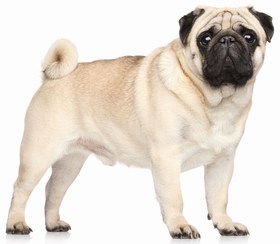 Pug | 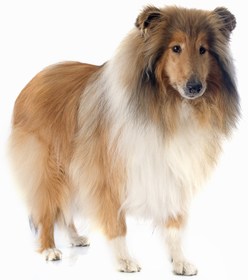 Collie | 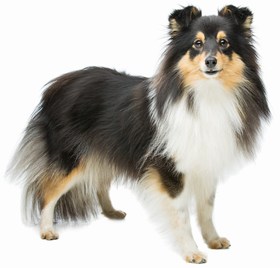 Shetland Sheepdog | 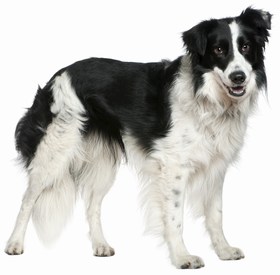 Border Collie |


